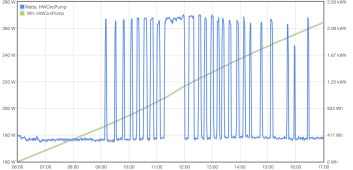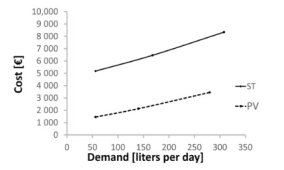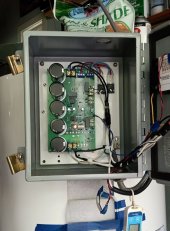This post got me thinking again, so I ran through the numbers in more detail. By far, my better option is to do geothermal and throw a few more panels into my setup to make up for the transition of energy from natural gas to electricity. The thing that sucks is at most I can only save the $600 I pay a year in natural gas since the electricity for my AC already comes from my current solar electric setup. So ignoring future natural gas price increases or the desire to be off grid, $600 a year is a long payback for even the hardware to do geothermal until I already have to replace my furnace and central AC.
You are using an out of date browser. It may not display this or other websites correctly.
You should upgrade or use an alternative browser.
You should upgrade or use an alternative browser.
Why almost no one doing Solar Thermal?
- Thread starter 1201
- Start date
That's pretty cool. So three 4x10 panels supply must of your hot water year round. Very nice . How much power does the pump use and about how many hours a day does it run?I have solar hot water; it is required by code in Hawaii. Flat panel system, direct loop of potable water. (Nice that we don't really need any glycol here.) It saves a huge amount of energy and in our climate is better than adding PV. The electric water heater needed 90kWh in the past year, which is essentially 10-15 days without enough sun.
I was originally planning on eliminating one of the three 4x10' panels because it is causing sag on one of the window headers and replacing it with PV. Once I had the metering data it became clear that it was a bad idea to do that.
We don't have heat, so it isn't used for that. The two 120-gallon tanks are 14 years old and might not make it to 20. They will be a bear to replace like-for-like; the space they are in has very little extra clearance. The level of storage is what we need for the house to minimize electric water heater use, but a compromise might be to do an inline 4kW instant booster water heater for the master bathroom
Ampster
Renewable Energy Hobbyist
There is a thermostatically controlled pump. I had the water boil once and it just went out the TP valve,What controls the temperature ? WHat happens when the water begins to boil ?
On a sunny day the pump runs about 20-30 3-10 minute cycles. Today (sunny) it used 213Wh. Attached graph shows the modulation; the base load is some IT equipment.That's pretty cool. So three 4x10 panels supply must of your hot water year round. Very nice . How much power does the pump use and about how many hours a day does it run?

Almost everybody that owns and lives in their house has it now; it paid back so insanely fast. Retrofitting today though I would do the same way as your brother. Schedule the heat pump to run at noon, and add a separate storage tank with extra insulation blanket.My brother has a place in Mauai and it must have been constructed before that code went into effect do it did not have thermal solar.
Thanks!On a sunny day the pump runs about 20-30 3-10 minute cycles. Today (sunny) it used 213Wh. Attached graph shows the modulation; the base load is some IT equipment.
View attachment 147741
Do you mind sharing which pump and controller you use?
is that iotawatt? How are you showing the cumulative consumption (green line)?
The pump is Grundfos, can't read the label on it for more detail. The controller is an old SunEarth "Goldline" 2-temperature comparator type system-- panel temp and tank temp; pump runs when panel temp is 20 degrees (or something) higher than the tank temp. One of the never-ending projects on my list is to make a new controller looking at high and low tank temperature for each of the two tanks as well as looking at the delta-t across the collector loop... but it is way down the list.Thanks!
Do you mind sharing which pump and controller you use?
is that iotawatt? How are you showing the cumulative consumption (green line)?
It is IoTaWatt; under the (default) "options" pane in Graph2 just check "accrue." I usually check "fill" for energy too. It will only accrue Wh.
Thanks very much for that info. I have an iotawatt and didn't know about the accrue option.The pump is Grundfos, can't read the label on it for more detail. The controller is an old SunEarth "Goldline" 2-temperature comparator type system-- panel temp and tank temp; pump runs when panel temp is 20 degrees (or something) higher than the tank temp. One of the never-ending projects on my list is to make a new controller looking at high and low tank temperature for each of the two tanks as well as looking at the delta-t across the collector loop... but it is way down the list.
It is IoTaWatt; under the (default) "options" pane in Graph2 just check "accrue." I usually check "fill" for energy too. It will only accrue Wh.
Grundfos makes some nice stuff but $$$
jrcromer
Sol-Ark Senior Technical Manager
- Joined
- Apr 13, 2022
- Messages
- 102
Back in the day, solar thermal was very popular. Pump water to the top of a building, and you can heat it and have the water pressure you need. Solar thermal is also 2.5x more efficient than PV, when used efficiently. As PV prices dropped, arguments about PV actually working better for water heating during cloudy weather came into play. There's also the project size - no contractor wants to do a $8k solar thermal project doing 35% of the electric bill for a small subset of homeowners, when they can do 3x the size, targeting 100% of the bill of all homeowners.
This means solar thermal is still very, very good... if you have the need for alot of hot water. So commercial, as well as swimming pool owners (at least, swimming pool owners who read DIYsolarforum).
But pragmatically, an electric hot water tank is the cheapest battery on the market. Put that bad boy on some smart load control (via the inverter, a load controller like Savant, or if you run Home Assistant, an Aeotec Zwave 40A controller) and you're way more cost effective than actually implementing solar thermal. So pour one out for solar thermal.
That said - if you like solar thermal, consider following Malta Solar. They're doing molten salt thermal to electric storage... like what was used with solar concentrators... but without the solar concentrator. So pour one out for solar concentrators too. PV has crushed all other forms of solar energy (aside from perhaps wind, and also, long duration solar storage i.e. fossil fuel). PV will continue to crush it until it's the primary fuel source of humanity unless we actually get behind nuclear or make significant inroads into fusion. Back to the topic - solar thermal will always be cost-effective for sites that have tremendous hot water needs, and will always need experts to implement it well.
This means solar thermal is still very, very good... if you have the need for alot of hot water. So commercial, as well as swimming pool owners (at least, swimming pool owners who read DIYsolarforum).
But pragmatically, an electric hot water tank is the cheapest battery on the market. Put that bad boy on some smart load control (via the inverter, a load controller like Savant, or if you run Home Assistant, an Aeotec Zwave 40A controller) and you're way more cost effective than actually implementing solar thermal. So pour one out for solar thermal.
That said - if you like solar thermal, consider following Malta Solar. They're doing molten salt thermal to electric storage... like what was used with solar concentrators... but without the solar concentrator. So pour one out for solar concentrators too. PV has crushed all other forms of solar energy (aside from perhaps wind, and also, long duration solar storage i.e. fossil fuel). PV will continue to crush it until it's the primary fuel source of humanity unless we actually get behind nuclear or make significant inroads into fusion. Back to the topic - solar thermal will always be cost-effective for sites that have tremendous hot water needs, and will always need experts to implement it well.
Yeah, $350 or so likely for a 1/6hp pump. I don't think that is a part I would cheap out on though; it will last longer than anything else in the system, rather than being the weakest link.Grundfos makes some nice stuff but $$$
Nobodybusiness
Collecting the leftovers of the Great Sky Reactor.
I have to guess because PV has become so cheap..In some parts of the world, up to 90% of homes have solar thermal systems. It wont work for all of the U.S but there are many areas that could support a simple solar thermal system yet I don't see a lot of places selling solar thermal equipment or a lot of people installing them.
Also, just looking at rough number it appears that thermal could actually be cheaper than PV, so,
Why have you decided to heat water with Solar PV instead of Solar thermal
Ampster
Renewable Energy Hobbyist
Is that efficiency factor include the type of water heater? I know that a heat pump water heater is 2-3 times more efficient than a water heater with resistive elements. I have used heat pump water heaters for ten years and am very happy with the quality of the latest models. My first one was a GeoSpring and it only lasted 5 years.Solar thermal is also 2.5x more efficient than PV, when used efficiently. As PV prices dropped, arguments about PV actually working better for water heating during cloudy weather came into play.
Pv is not that cheap lol. I think professionally installed thermal is just too bloody expensiveI have to guess because PV has become so cheap..
I heard that the heat pump water heaters are not serviceable? So if it goes out outside of warranty it's done?Is that efficiency factor include the type of water heater? I know that a heat pump water heater is 2-3 times more efficient than a water heater with resistive elements. I have used heat pump water heaters for ten years and am very happy with the quality of the latest models. My first one was a GeoSpring and it only lasted 5 years.
heat pump water heaters are not serviceable?
It's essentially a simple pump with some refrigerant lines. My monoblock air-to-water is pretty easily serviceable.
Ampster
Renewable Energy Hobbyist
My GeoSpring stopped working within warranty but GE sold that business to another manufacturer who was supposed to do warranty work. They were difficult to deal with. I got my payback so I purchased a Rheem/Ruud. I have used Rheem/Ruud in three homes with no issues.I heard that the heat pump water heaters are not serviceable? So if it goes out outside of warranty it's done?
in 2007 I installed a 110 tube evacuated glass tube system for domestic hot water. At the time it was the same cost per unit of energy produced as PV. Today I would not bother with thermal. I'd use PV since PV costs are way cheaper than thermal.
However, the system has been trouble free all these years. Do PV inverters last this long?
However, the system has been trouble free all these years. Do PV inverters last this long?
~85% vs ~21% on the collection side, so the COP of 3.5-4 gets it pretty close. storage losses are harder to compare.Is that efficiency factor include the type of water heater? I know that a heat pump water heater is 2-3 times more efficient than a water heater with resistive elements. I have used heat pump water heaters for ten years and am very happy with the quality of the latest models. My first one was a GeoSpring and it only lasted 5 years.
Ampster
Renewable Energy Hobbyist
Okay I understand. I view my PV as sunk cost so powering a HPWH has the same zero cost of fuel as thermal solar so maintaining and installing one system is my optimum choice. That is why I have not done thermal solar since installing PV solar twelve years ago.When the fuel cost is zero, the efficiency of collection is less important than efficiency of the capital investment to convert energy to heat or electricity.~85% vs ~21% on the collection side,
Last edited:
efficientPV
Solar Addict
- Joined
- Sep 24, 2019
- Messages
- 1,360
When roof real estate is precious, thermal is a poor use of space. Electricity has many uses and thermal is just a waste of hardware once water is up to temperature. I heat with PV resistance and it only uses excess power that would normally be wasted. PV/HPWH can be a major cost and most who do it have already invested in that hardware. I have only a small system that cost almost nothing by investing in panels instead and use a minimal controller, inverter and small battery. My water is up to temp by 10am so I can use the dishwasher. My system uses three HW controllers on a priority basis. The final excess goes to a HW tank for my laundry. Shown is the water heater control in my garage for laundry which efficiently matches PV array to heating element. The technology is there, It just hasn't come to the solar world yet cheaply.
This cost study is from a 2021 Spanish solar paper comparing the two. If any place would be cost effective with thermal I would think it would be Spain. It also states that an efficient PV controller to heat water should only cost about 60 euro. Absolutely true, that is about what mine cost.
This cost study is from a 2021 Spanish solar paper comparing the two. If any place would be cost effective with thermal I would think it would be Spain. It also states that an efficient PV controller to heat water should only cost about 60 euro. Absolutely true, that is about what mine cost.
Attachments
Similar threads
- Replies
- 11
- Views
- 250
- Replies
- 16
- Views
- 1K
- Replies
- 0
- Views
- 447
- Replies
- 4
- Views
- 479




